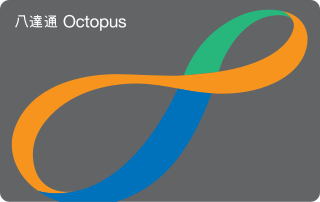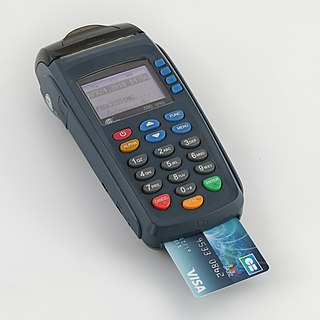Related Research Articles

A debit card, also known as a check card or bank card, is a payment card that can be used in place of cash to make purchases. The card usually consists of the bank's name, a card number, the cardholder's name, and an expiration date, on either the front or the back. Many new cards now have a chip on them, which allows people to use their card by touch (contactless), or by inserting the card and keying in a PIN as with swiping the magnetic stripe. Debit cards are similar to a credit card, but the money for the purchase must be in the cardholder's bank account at the time of the purchase and is immediately transferred directly from that account to the merchant's account to pay for the purchase.

A telephone card, calling card or phone card for short, is a credit card-size plastic or paper card used to pay for telephone services. It is not necessary to have the physical card except with a stored-value system; knowledge of the access telephone number to dial and the PIN is sufficient. Standard cards which can be purchased and used without any sort of account facility give a fixed amount of credit and are discarded when used up; rechargeable cards can be topped up, or collect payment in arrears. The system for payment and the way in which the card is used to place a telephone call vary from card to card.

A smart card (SC), chip card, or integrated circuit card, is a card used to control access to a resource. It is typically a plastic credit card-sized card with an embedded integrated circuit (IC) chip. Many smart cards include a pattern of metal contacts to electrically connect to the internal chip. Others are contactless, and some are both. Smart cards can provide personal identification, authentication, data storage, and application processing. Applications include identification, financial, public transit, computer security, schools, and healthcare. Smart cards may provide strong security authentication for single sign-on (SSO) within organizations. Numerous nations have deployed smart cards throughout their populations.

The Octopus card is a reusable contactless stored value smart card for making electronic payments in online or offline systems in Hong Kong. Launched in September 1997 to collect fares for the territory's mass transit system, it has grown into a widely used system for transport and other retail transactions in Hong Kong. It is also used for purposes such as recording school attendance and permitting building access. The cards are used by 98 percent of the population of Hong Kong aged 15 to 64 and the system handles more than 15 million transactions, worth over HK$220 million, every day.

A stored-value card (SVC) or cash card is a payment card with a monetary value stored on the card itself, not in an external account maintained by a financial institution. This means no network access is required by the payment collection terminals as funds can be withdrawn and deposited straight from the card. Like cash, payment cards can be used anonymously as the person holding the card can use the funds. They are an electronic development of token coins and are typically used in low-value payment systems or where network access is difficult or expensive to implement, such as parking machines, public transport systems, and closed payment systems in locations such as ships.

A charge card is a type of credit card that enables the cardholder to make purchases which are paid for by the card issuer, to whom the cardholder becomes indebted. The cardholder is obliged to repay the debt to the card issuer in full by the due date, usually on a monthly basis, or be subject to late fees and restrictions on further card use. Charge cards are distinct from traditional credit cards, which are revolving credit instruments that do not need to be paid in full every month and a balance may be carried over, on which interest is paid. Charge cards are typically issued without spending limits, whereas credit cards usually have a specified credit limit that the cardholder may not exceed. Most charge cards are held by businesses, corporations or executives thereof, and are issued to customers with a good or excellent credit score.
Suica is a prepaid rechargeable contactless smart card and electronic money system used as a fare card on train lines and other public transport systems in Japan, launched on November 18, 2001, by JR East. The card can be used across the nation as part of Japan's Nationwide Mutual Usage Service. The card is also widely used as electronic money for purchases at stores and kiosks, especially at convenience stores and within train stations. In 2018, JR East reported that Suica was used for 6.6 million daily transactions. As of October 2023, 95.64 million Suica have been issued, and 1.63 million stores accept payment via Suica's digital currency.

EMV is a payment method based on a technical standard for smart payment cards and for payment terminals and automated teller machines which can accept them. EMV stands for "Europay, Mastercard, and Visa", the three companies that created the standard.

A traveller's cheque is a medium of exchange that can be used in place of hard currency. They can be denominated in one of a number of major world currencies and are preprinted, fixed-amount cheques designed to allow the person signing it to make an unconditional payment to someone else as a result of having paid the issuer for that privilege.
Moneo, sometimes branded as mon€o, was an electronic purse system available on French bank cards to allow small purchases to be made without cash used from 1999 to 2015.
SmartRider is the contactless electronic ticketing system of the Public Transport Authority of Western Australia. The system uses RFID smartcard technology to process public transport fares across public bus, train, and ferry services.
A direct debit or direct withdrawal is a financial transaction in which one organisation withdraws funds from a payer's bank account. Formally, the organisation that calls for the funds instructs their bank to collect an amount directly from another's bank account designated by the payer and pay those funds into a bank account designated by the payee. Before the payer's banker will allow the transaction to take place, the payer must have advised the bank that they have authorized the payee to directly draw the funds. It is also called pre-authorized debit (PAD) or pre-authorized payment (PAP). After the authorities are set up, the direct debit transactions are usually processed electronically.

Payment cards are part of a payment system issued by financial institutions, such as a bank, to a customer that enables its owner to access the funds in the customer's designated bank accounts, or through a credit account and make payments by electronic transfer with a payment terminal and access automated teller machines (ATMs). Such cards are known by a variety of names, including bank cards, ATM cards, client cards, key cards or cash cards.
Debit card cashback is a service offered to retail customers whereby an amount is added to the total purchase price of a transaction paid by debit card and the customer receives that amount in cash along with the purchase. For example, a customer purchasing $18.99 worth of goods at a supermarket might ask for twenty dollars cashback. The customer would approve a debit payment of $38.99 to the store, and the cashier would then give the customer $20 in cash.
Authorization hold is a service offered by credit and debit card providers whereby the provider puts a hold of the amount approved by the cardholder, reducing the balance of available funds until the merchant clears the transaction, after the transaction is completed or aborted, or because the hold expires.
ATM usage fees are what many banks and interbank networks charge for the use of their automated teller machines (ATMs). In some cases, these fees are assessed solely for non-members of the bank; in other cases, they apply to all users. There is usually a higher fee for the use of White-label ATMs rather than bank-owned ATMs.

Contactless payment systems are credit cards and debit cards, key fobs, smart cards, or other devices, including smartphones and other mobile devices, that use radio-frequency identification (RFID) or near-field communication (NFC) for making secure payments. The embedded integrated circuit chip and antenna enable consumers to wave their card, fob, or handheld device over a reader at the point-of-sale terminal. Contactless payments are made in close physical proximity, unlike other types of mobile payments which use broad-area cellular or Wi-Fi networks and do not involve close physical proximity.

A payment terminal, also known as a point of sale (POS) terminal, credit card machine, card reader, PIN pad, EFTPOS terminal, is a device which interfaces with payment cards to make electronic funds transfers. The terminal typically consists of a secure keypad for entering PIN, a screen, a means of capturing information from payments cards and a network connection to access the payment network for authorization.

Credit card fraud is an inclusive term for fraud committed using a payment card, such as a credit card or debit card. The purpose may be to obtain goods or services or to make payment to another account, which is controlled by a criminal. The Payment Card Industry Data Security Standard is the data security standard created to help financial institutions process card payments securely and reduce card fraud.

A credit card is a payment card, usually issued by a bank, allowing its users to purchase goods or services, or withdraw cash, on credit. Using the card thus accrues debt that has to be repaid later. Credit cards are one of the most widely used forms of payment across the world.
References
- 1 2 derstandard.at (German) 22 December 2015